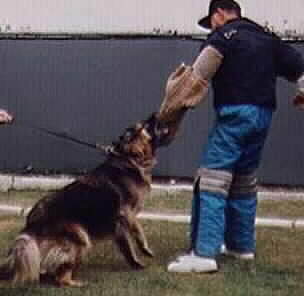Bite work Training for Shasta the German Shepard
Shirley Robinson
When I got Shasta, a magnificent long hair German Shepherd, I wanted her
mainly as a family pet and companion to our disabled son,
Sterling because of her sweet disposition and her gentle, tolerant personality.
Her father was a working police dog in Germany. Because we live in a big
city, I wondered if Shasta could be a good candidate for training in personal
protection. When I inquired, some professional trainers warned that if I trained
Shasta in bite work (personal protection), she would no longer be a good family
pet. In other words, I couldn't have it both ways
 I decided to take the chance and began training sessions on a weekly basis with
Neil Berkow. I knew him to be a professional personal protection licensed trainer
with years of experience. Working with Neil, I found out that he did not take
the dog from me to train her. Instead, he worked with me and taught me how to
train the dog myself. We worked together as a team, me, Neil and Shasta.
I decided to take the chance and began training sessions on a weekly basis with
Neil Berkow. I knew him to be a professional personal protection licensed trainer
with years of experience. Working with Neil, I found out that he did not take
the dog from me to train her. Instead, he worked with me and taught me how to
train the dog myself. We worked together as a team, me, Neil and Shasta.
Obedience Training
The first thing Neil taught me was to do good obedience training with Shasta.
Good obedience training is important for the dog and the owner. This is also
necessary for safety reasons.
Because of Neil, training sessions were a lot of fun for both me and Shasta.
I learned to train my dog in motivation mode, meaning that she is eager
to please me and do a good job. I also learned how to correctly praise
her for good accomplishment and how to administer proper correction..
A bite work session with Neil can vary in length to prevent the dog from tiring
or being bored. We always finished the training on a strong bite to give
Shasta a win that she'd done a good job.
I feel very safe now in the big city with Shasta by my side all the time.
I never leave the apartment without her. She is fiercely protective and instantly
acts (attack) on command. Because she is very well trained in obedience and
will instantly stay put on command I have no need to keep her on the leach when
I take her for a walk. Shasta is very friendly and playful with other dogs and
she has also remained a perfect family pet. Her sweet disposition and gentleness
with my handicapped son and with people and children in general has not been
affected by the personal protection training. With Shasta, I do have it both ways!
Soon she developed mitosis of the
jaw bones (very painful inflammation of the muscle) and the vet suggested that
I put her to sleep because "nothing could be done to ease her suffering or to
cure her" Instead, I turned to holistic health and she completely recovered
her health.
Note: I would never board my dog in a kennel for personal protection
training because:
- I believe that the separation can cause a great deal of stress and grief
to the dog, not to mention the owner.
- Some dogs may experience a change of personality at the hand of rough
and bad trainers
- I believe that best results are achieved when working together as a
team - you, the dog, and the trainer

Personal protection Dog Training
A great book that I recommend:
 Training in Drive by Sheila Booth - with Gottfried
Dildei. This book is probably the best book ever written on how to train
a dog using motivational techniques. This book is for lay/dilettante and professional trainers.
Training in Drive by Sheila Booth - with Gottfried
Dildei. This book is probably the best book ever written on how to train
a dog using motivational techniques. This book is for lay/dilettante and professional trainers.
'Training in Drive' is an excellent introduction to the concept of motivational
obedience training. The basic concept of 'training in drive' is to teach the
dog that accurately completing obedience commands will earn him a chance to
satisfy his desire for food or play. The dog should therefore learn to enjoy
training and approach it with an enthusiastic, focused attitude.
Although a little theory is included, this book is basically a series of
step-by-step 'cookie cutter' recipes to be followed, with the end result a dog
that can happily and accurately compete in a Schutzhund obedience trial.
Although the recipes in this book are aimed at readers wishing to teach Schutzhund obedience
to large dogs, with a little creativity they can be applied to training for
any competition obedience with any moderate-to-high drive dog. The main differences
 between training for these two disciplines are found in the heeling chapter
- unlike Schutzhund heeling, competition obedience heeling does not follow a
set pattern that the dog can learn by heart, and it is also difficult to use
the 'lure' food method to teach heeling with smaller dogs.
between training for these two disciplines are found in the heeling chapter
- unlike Schutzhund heeling, competition obedience heeling does not follow a
set pattern that the dog can learn by heart, and it is also difficult to use
the 'lure' food method to teach heeling with smaller dogs.
Here are techniques that give our dogs credit for being intelligent, sensitive
creatures who enjoy working when we allow them to think for themselves. This
happy attitude assures your dog will work joyfully and correctly many more years
than any force training can ever produce."
Training with the prong collar
Professional dog trainer, Ed Frawley
writes: "I call a prong collar "Power Steering for Dogs". A prong is probably
the most misunderstood training tool there is in dog work, next to the whip.
So many people take one look at it and say "Oh !!! I could NEVER use that on
MY DOG!!!". Then when I explain how its used and why it used they call back
and say "ED, THIS IS THE GREATEST THING SINCE SLICED br /EAD!!!!" (prong collars
are available at most pet stores)l
Farewell to Shasta
In early May 2003, at age 12 1/2, Shasta began to urinate blood. She
appeared in no pain but she became feeble. On the 10, she suddenly became paralized
in her hind legs. I suspected kidney trouble. She was at the end of her road
and I had to have her euthanize on May 12. It was a quick, peaceful and painless
death. I held her and said farewell. I was filled with gratitude for the 10
marvelous years she shared with us in love and respect. She had a wonderful
life and it is a miracle that she lived that long. When I adopted her at age
two, this poor girl was so overloaded with toxins from routine chemical deworming,
vaccines and toxic kibble food that the vet wanted to euthanize her then. I
believe she would have lived a much longer life if she had been br /ed from
healthy parents and had not been poisoned by all these chemicals.

Looking for a HEALTHY German Shepherd puppy raised with the holistic approach?
-
In the USA: Steel Cross Shepherds.
Renee Thacker Renee@steelcross-gsd.com
520-982-7603
- In the USA: Valerie Gainer br /eeds working line GSDs. She has excellent
dogs. She also feeds a 100% raw diet. email:
GSD2727@aol.com
- In Canada: German Shepherds Harphill Kennels. They specialize in br
/eeding dogs for Tracking, Obedience Trials and Therapy and loyal companions
in family environments. They use raw diet and with the minimal vaccinations
to produce working and competition litters.
- In Canada: Riveriene Farm puppies are naturally reared on natural nutrition.
Riveriene Farm has experienced the positive effects of wholistic care and
feeding since 1989. All their dogs are presently reared and maintained successfully
on their explication of Dr. Ian Billinghursts BARF
program (BARF = bones and raw food). Riveriene Farm consults and teach alternative
feeding methods for dogs (and cats). Their German Shepherd puppies
have aptitude for training in Schutzhund, competitive obedience or as a
top companion.
- BARFingGSDs EGroup
- For owners of German Shepherds who are feeding, or seriously considering
feeding BARF (Bones And Raw Food or Biologically Appropriate Raw Food) diet.
This will be a relaxed forum where we can discuss how a BARF diet can help
optimize our German Shepherd's health and to discuss the br /eed in general.
New members are encouraged to post an introduction to say hello and to tell
us a little about yourself and your beautiful Shepherd.
- German Shepherd Web Board
is a great place to adopt GSD in need of good home and to connect to others
for help and support.